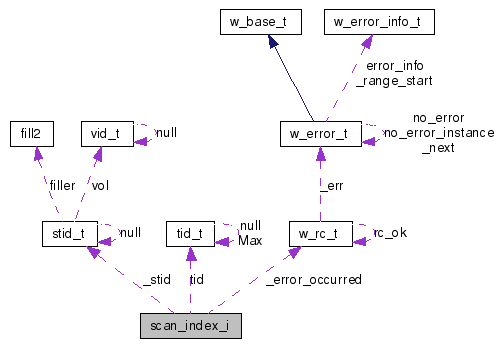
Collaboration diagram for scan_index_i:

To iterate over the {key,value} pairs in an index, construct an instance of this class, and use its next() method to advance the cursor and the curr() method to copy out keys and values into server-space. It is unwise to delete or insert associations while you have a scan open on the index (in the same transaction).
Example code:
stid_t fid(1,7); scan_index_i scan(fid, scan_index_i::ge, vec_t::neg_inf, scan_index_i::le, vec_t::pos_inf, false, ss_m::t_cc_kvl); bool eof(false); do { w_rc_t rc = scan.next(eof); if(rc.is_error()) { // handle error ... } if(eof) break; // get the key len and element len W_DO(scan.curr(NULL, klen, NULL, elen)); // Create vectors for the given lengths. vec_t key(keybuf, klen); vec_t elem(&info, elen); // Get the key and element value W_DO(scan.curr(&key, klen, &elem, elen)); ... } while (1);
create_rec.cpp, log_exceed.cpp, sort_stream.cpp, and vtable_example.cpp.
Definition at line 160 of file scan.h.
Public Member Functions | |
| NORET | scan_index_i (const stid_t &stid, cmp_t c1, const cvec_t &bound1, cmp_t c2, const cvec_t &bound2, bool include_nulls=false, concurrency_t cc=t_cc_kvl, lock_mode_t mode=SH) |
| Construct an iterator. | |
| rc_t | curr (vec_t *key, smsize_t &klen, vec_t *el, smsize_t &elen) |
| rc_t | next (bool &eof) |
| void | finish () |
| bool | eof () |
| If false, curr() may be called. | |
| tid_t | xid () const |
| If false, curr() may be called. | |
| ndx_t | ndx () const |
| const rc_t & | error_code () const |
| NORET scan_index_i::scan_index_i | ( | const stid_t & | stid, | |
| cmp_t | c1, | |||
| const cvec_t & | bound1, | |||
| cmp_t | c2, | |||
| const cvec_t & | bound2, | |||
| bool | include_nulls = false, |
|||
| concurrency_t | cc = t_cc_kvl, |
|||
| lock_mode_t | mode = SH | |||
| ) |
Construct an iterator.
| [in] | stid | ID of the B-Tree to be scanned. |
| [in] | c1 | Comparison type to be used in the scan for lower bound comparison : eq, gt, ge, lt, le |
| [in] | bound1 | Lower bound |
| [in] | c2 | Comparison type to be used in the scan for upper bound comparison : eq, gt, ge, lt, le |
| [in] | bound2 | Upper bound |
| [in] | include_nulls | If true, we will consider null keys as satisfying the condition. |
| [in] | cc | Can be used to override the concurrency_t stored in the store descriptor (see ss_m::get_store_info and sm_store_info_t)) in a few situations. |
| [in] | mode | Can be used to override the mode in which the store is locked. |
cc | t_cc_none | t_cc_modkvl | t_cc_im | t_cc_kvl | t_cc_file
Created |
-------------------------------------------------------------------
t_cc_none | IS/none | IS/modkvl | IS/im | IS/kvl | SH/none
-------------------------------------------------------------------
t_cc_modkvl| IS/none | IS/none | IS/modkvl | IS/modkvl | SH/none
-------------------------------------------------------------------
t_cc_im | IS/im | IS/im | IS/im | IS/im | SH/file
-------------------------------------------------------------------
t_cc_kvl | IS/kvl | IS/kvl | IS/kvl | IS/kvl | SH/file
-------------------------------------------------------------------
t_cc_file | error | error | error | error | SH/none
-------------------------------------------------------------------
The protocol t_cc_modkvl is a modified key-value locking protocol created for the Paradise project, and behaves as follows: -only allow "eq" comparsons : bound1 : eq X and boudn2: eq X -grabs an SH lock on the bound X, whether or not the index is unique
The protocol t_cc_im treats the value part of a key-value pair as a record id, and it acquires a lock on the record rather than on they key-value pair. Otherwise it is like normal key-value locking.
Although they are called "lower bound" and "upper bound", technically the two conditions can be reversed, for example, c1= le, bound1= vec_t::pos_inf and c2= ge, bound2= vec_t::neg_inf.
brief Get the key and value where the cursor points.
| [out] | key | Pointer to vector supplied by caller. curr() writes into this vector. A null pointer indicates that the caller is not interested in the key. |
| [out] | klen | Pointer to sm_size_t variable. Length of key is written here. |
| [out] | el | Pointer to vector supplied by caller. curr() writes into this vector. A null pointer indicates that the caller is not interested in the value. |
| [out] | elen | Pointer to sm_size_t variable. Length of value is written here. |
| rc_t scan_index_i::next | ( | bool & | eof | ) | [inline] |
brief Move to the next key-value pair in the index.
| [out] | eof | True is returned if there are no more pairs in the index. If false, curr() may be called. |
Definition at line 256 of file scan.h.
References w_rc_t::reset().
Here is the call graph for this function:

| void scan_index_i::finish | ( | ) |
Free the resources used by this iterator. Called by desctructor if necessary.
 1.4.7
1.4.7